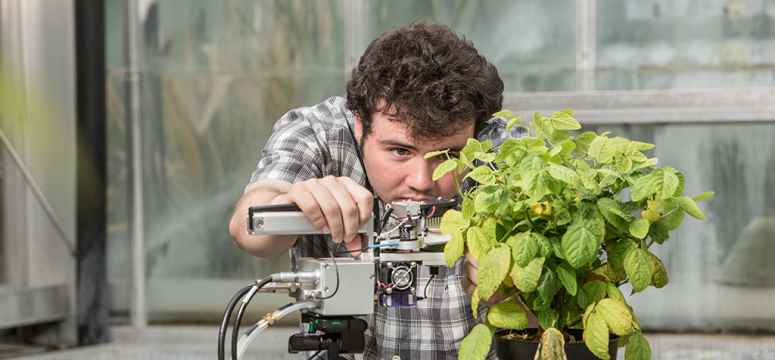Greenhouse Guru

From Kenyon News - August 2, 2017
An electric razor seems an unlikely laboratory instrument, yet it played a crucial role this summer in the research of biology major Sam Lisak ’19. He used the razor to give plant leaves a close shave, so he could examine the water transport in leaf hairs called trichomes, comparing the function of damaged trichomes to healthy ones.
The razor was one of several instruments, including a psychrometer, Lisak used to measure water loss and water absorption among the leaves of two plants: the soybean, abundant in the Midwest, and brittlebush (Encelia actoni), a desert shrub of the southwestern U.S. “We wanted to get a sense of the function trichomes play in water usage,” he said. “It has not been thoroughly studied.”
According to Lisak’s faculty mentor, Assistant Professor of Biology Christopher Bickford, unlocking one of the mysteries behind the complex ways plants use water could help plants prosper under difficult conditions in the future.
“These studies are important,” Bickford said, “because one of the species we are using, soybeans, is so important to global agriculture. Tens of millions of acres of soybeans are planted just in the United States. If we can detect leaf water loss or gain that is currently unaccounted for in crop water-use models, those are potentially useful for plant breeders and agronomists.”
Some of Lisak’s findings came as a surprise to him. “The water loss was lower in leaves with trichomes and that is not what we expected — trichomes would increase surface area, which logic would tell us would increase water loss, but the opposite was true.”
Lisak, who conducted the research as a Kenyon Summer Scholar, plans to present his analysis at the American Society of Plant Biologists meeting in Montreal. He will continue to work with Bickford to compile additional data for publication in a scientific journal. A biology major from Oak Park, Illinois, Lisak wants to pursue a career in plant conservation, either in public policy or research. He appreciates the opportunity to experience the research process with Bickford — working with data, interpreting it and publishing the results.
“The chance to do undergraduate research was one of the main reasons I chose to come to Kenyon,” he said.